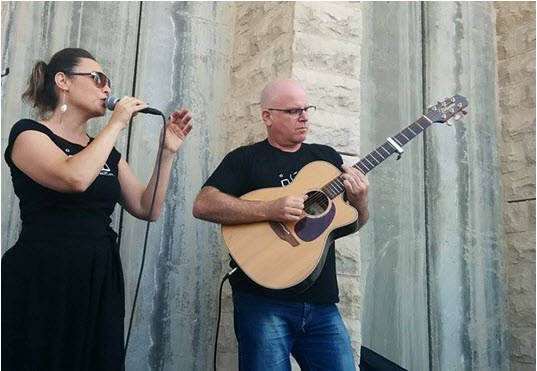At least 600 Israeli and Palestinians activists, among them several members of the Communist Party of Israel and Hadash, marched on Friday, July 15, in the monthly Freedom March. This march also marked the 10th anniversary of the founding of the Combatants for Peace (CFP) movement. Joining the protest Alistair Little and Gerard Foster, former combatants from the opposing sides of the conflict in Northern Ireland. The march was organized by CFP and Standing Together.

Mira Awad singing a song composed to the words of the Palestinian national poet Mahmoud Darwish during the Freedom March which took place on July 15 (Photo: Combatants for Peace)
The march set out from the intersection near the entrance to the village of Battir, south of Bethlehem. The marchers moved along Route 60, a road frequented by Israeli settlers living in the area, and headed to the terminus adjacent to the “tunnel checkpoint” separating the area of Bethlehem from Jerusalem. During the march activists and members of CFP used hand-made puppets to close the road and chanted slogans calling for the end of the occupation and the establishment of a independent Palestinian state alongside Israel.
In a speech he delivered the checkpoint, Ra’ed Haddar, coordinator of the regional groups of CFP, told the gathering: “We are here to stay we are not leaving, we do not fear your weapons because we believe in justice and peace.”
From among the Israeli participants, CFP activist Netta Hazan said: “As a Mizrahi woman, a daughter of Moroccan and Egyptian Jews, I feel a deep obligation to stand by my Palestinian brothers and sisters, because both of us are struggling against oppression.” Hazan said that “both Palestinians and Mizrahi people in Israel are subject to discrimination. The method used by of the Israeli establishment is to create a common enemy, the Arab, in order to control us. But many Jews and Muslims still coexist together in harmony. I believe that another way is possible; together we can create a non-violent culture.”
Gerard Foster from Northern Ireland also delivered a speech in which he said: “The fight for peace is a lonely road, sometimes you find yourselves standing alone, but let me tell you, you are not alone, you inspire us all.” In the last speech of the day’s event, Sami Awad, Director of the Palestinian NGO Holy Land Trust, spoke to the Israeli protesters and said: “To those Israelis who are here seeking peace with me because they are afraid of me, and want me to become less of a threat to them, I say go back to your home; I do not want your peace. To those Israelis who are here because they believe in peace, they believe in justice, they believe in freedom and equality, and they are ready to commit to talking and walking this path, I don’t only say welcome, but also say my home is yours.” At the end of the day’s event Mira Awad, a well-know Arab-Palestinian from Israel singer performed a song composed to accompany the words of the renowned Palestinian poet Mahmoud Darwish.
The event was attended by American filmmaker Stephen Apkon, who directed a new documentary film named “Disturbing the Peace,” which was premiered on Thursday at the Jerusalem Film Festival. Israel banned a Palestinian militant turned peace activist, Shifa al-Qudsi, one of the activists featured in the documentary, from attending the Jerusalem premier of the documentary in which she appears. The Shin Bet, Israel’s internal security agency, said that al-Qudsi was barred from entering Israel from the West Bank for “security reasons.” In 2002, Al-Qudsi was preparing to carry out a suicide bombing when Israeli troops arrested her. She spent six years in prison, and after her release, got involved with “Combatants for Peace.” Al-Qudsi said she didn’t understand the decision. “Since I got out of prison, I have been calling for peace,” she said.
The CFP movement calls for the establishment of an independent Palestinian state based on the borders of June 4, 1967, with its capital in East Jerusalem, alongside Israel. CFP uses nonviolent means and calls upon people from both nations to join it in achieving peace and reconciliation between Palestinians and Israelis.


